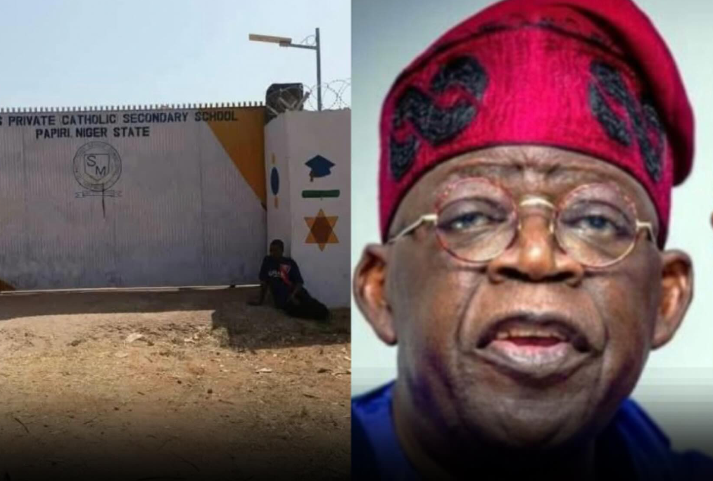
“Like Being in Prison”: UK Minister Kemi Badenoch Recounts Her Harrowing Experience at Nigerian Secondary School

In a deeply personal and eye-opening revelation that has sparked both controversy and conversation across the Nigerian and British digital spheres, UK Minister for Business and Trade, Kemi Badenoch, has compared her experience at a Nigerian secondary school to being imprisoned. The statement, which was made during a recent public event in the United Kingdom, is now reverberating across social media platforms and raising questions about the state of boarding schools in Nigeria—especially the prestigious Federal Government Colleges once revered as the pride of the nation’s education system.
Badenoch, a British-Nigerian Conservative politician, who has long been known for her forthright views on issues relating to identity, culture, and governance, did not mince words while recalling her early teenage years at Federal Government Girls College, Sagamu in Ogun State. “I went to a secondary school. It was called a Federal Government Girls school in a place called Sagamu and that was like being in prison…” she said, a statement that instantly struck a nerve with many Nigerians who either attended or are familiar with the infamous rigour of unity schools across the country.
Her words paint a vivid picture of hardship and institutional rigidity, a shared memory for thousands of Nigerians who have passed through similar schools. For some, it was a nostalgic reminder of discipline, moral instruction, and the rustic camaraderie of hostel life. For others, especially in Badenoch’s case, it resurrected memories of suffering, emotional strain, and cultural shock. Her use of the phrase “like being in prison” wasn’t just about the physical conditions but also a reference to the overwhelming sense of confinement, regimentation, and, in some cases, outright abuse that many students endured in those environments.
It wasn’t long before Nigerians on X (formerly Twitter) and other social platforms began to weigh in, with opinions divided along generational, class, and even political lines. Some accused Badenoch of painting Nigeria in a bad light, suggesting her statement feeds into the stereotypical Western narrative of African dysfunction. Others commended her for her honesty and bravery in telling her story as it was, unfiltered and raw, regardless of how it might be received. “Why should she sugarcoat her experience just to please sentimental Nigerians?” asked one user. “What she said is true for many of us—we endured more than just education in those schools, we endured trauma.”
Federal Government Colleges, popularly called Unity Schools, were created after the Nigerian Civil War to promote national unity by bringing together students from diverse ethnic and religious backgrounds. While the vision was noble and the early years of these schools saw excellent academic results and strict discipline, decades of underfunding, corruption, and policy neglect have eroded their former glory. Facilities are often dilapidated, teachers are poorly motivated, and the environments, in many cases, are far from ideal. Badenoch’s description, while harsh, may not be far from reality for countless students who passed through similar schools during Nigeria’s turbulent educational years in the 1980s and 1990s.
Kemi Badenoch’s personal journey is itself remarkable. Born in the UK to Nigerian parents and raised between Nigeria and the UK, she has climbed the political ladder to become one of the most influential Black women in British politics. Her perspective straddles both worlds, and this duality makes her voice both powerful and complex. In reflecting on her Nigerian experience, she often juxtaposes the two systems—highlighting the strengths and failures of both societies. It’s not the first time she has courted controversy over comments related to race, migration, or identity, but this latest revelation feels particularly intimate. It is less about political posturing and more about a lived reality that shaped her formative years.
Interestingly, Badenoch’s remark also mirrors a wider conversation that many Nigerians are beginning to have about boarding schools and the impact they have on students’ mental health and emotional development. For decades, stories of bullying, poor nutrition, corporal punishment, and extreme discipline have circulated—often dismissed as “rites of passage” or “character building.” But in a world increasingly attentive to childhood trauma and emotional intelligence, these conversations are now taking a different tone. Many former students have taken to social media to recount their own traumatic experiences in these institutions, some even calling for a total overhaul of the boarding school system.
The Ministry of Education in Nigeria has yet to respond officially to Badenoch’s statement, but some educational stakeholders have already reacted. A senior official in the Federal Ministry of Education, speaking anonymously, described Badenoch’s words as “an unfortunate exaggeration that does not reflect the spirit or intent of our Unity Schools.” However, education rights groups are urging the government to look beyond the offense and use this as a wake-up call to reassess the conditions of public boarding schools.
Alumni of FGGC Sagamu have also begun to speak up. Some agree with Badenoch’s sentiment, citing tough conditions, lack of care, and psychological stress during their school years. Others insist the school offered an unparalleled foundation for success, discipline, and excellence. “It was tough, yes,” one former student wrote, “but I wouldn’t trade that experience for anything. It made me who I am.”
Whether seen as a necessary crucible or a traumatic memory, Badenoch’s story has reopened a long-ignored debate about the nature of Nigerian boarding schools. Are these institutions still fulfilling their original purpose, or have they become relics of a bygone era desperately in need of reform? And more importantly, how many other voices, like Kemi’s, are out there—carrying emotional baggage they never had the space to unpack?
As the discourse continues, what remains undeniable is that Kemi Badenoch’s single sentence has managed to pierce through decades of silence around the lived experiences of young Nigerians in boarding schools. It is not just a comment about a school in Sagamu—it is a spotlight on an entire system and the many lives it has shaped, for better or worse. Whether Nigerians choose to confront the truth or dismiss it as foreign criticism, one thing is clear: the conversation has begun, and it is long overdue.


